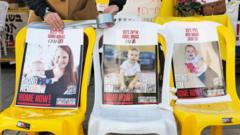Reports have emerged that Hamas intends to release three hostages in a complex dynamic affecting the ongoing cease-fire agreement with Israel, highlighting the tension and uncertainty.
Hamas Announces Hostage Releases Amid Cease-fire Tensions

Hamas Announces Hostage Releases Amid Cease-fire Tensions
In the latest developments, Hamas names hostages to be freed, igniting discussions on the future of the cease-fire between Israel and Hamas.
In a significant step towards resolving current tensions, Hamas has identified three hostages slated for release as part of an ongoing exchange process with Israel, despite previous threats to pause releases. The group named the hostages as Alexander Troufanov, Sagui Dekel-Chen, and Yair Horn, with Troufanov being a dual Russian-Israeli national who was taken alongside several family members during the aggressive assaults that took place on October 7, 2023.
The Palestinian Islamic Jihad, a smaller militant faction allied with Hamas, confirmed that they would also release Troufanov. Tension mounted when Hamas declared earlier this week that it would pause further releases due to allegations of Israeli violations of the terms of the ongoing cease-fire provision, which is aimed at curbing escalating violence in the region.
The cease-fire agreement reached in January was a multistage initiative designed to halt hostilities and facilitate extensive humanitarian support and resources into Gaza. It initially mandated a truce of 42 days in which Hamas is expected to release at least 33 hostages in exchange for over 1,500 Palestinian prisoners.
Recently, however, claims by Hamas have accused Israel of breaching this agreement by deploying troops beyond established cease-fire lines and failing to provide adequate housing supplies for the thousands of displaced Palestinians. According to the terms, the delivery of at least 60,000 prefabricated housing units and 200,000 tents has been outlined for the first phase of the deal, along with essential rubble clearance equipment.
Despite these expectations, as of Friday, the Israeli government has issued no immediate comment regarding adherence to these obligations. Omer Dostri, spokesperson for Prime Minister Benjamin Netanyahu, indicated that Israel is currently withholding the entry of such housing and construction supplies, yet did not elaborate on potential changes to this policy.
As negotiations toward the second phase of the cease-fire remain stagnant with no agreement reached on extending the truce, there is growing concern about its viability. The expiration of the current phase is slated for early March, while indirect discussions regarding crucial elements such as future battles, retention of hostages, and possible troop withdrawals from Gaza are still lacking significant progress.
Amidst this backdrop, pressures intensify within Netanyahu's right-wing coalition to reconsider resuming military actions against Hamas, raising further uncertainties over the cease-fire’s future and enduring peace efforts.
Aaron Boxerman is a Times reporter covering Israel and Gaza. He is based in Jerusalem.
The Palestinian Islamic Jihad, a smaller militant faction allied with Hamas, confirmed that they would also release Troufanov. Tension mounted when Hamas declared earlier this week that it would pause further releases due to allegations of Israeli violations of the terms of the ongoing cease-fire provision, which is aimed at curbing escalating violence in the region.
The cease-fire agreement reached in January was a multistage initiative designed to halt hostilities and facilitate extensive humanitarian support and resources into Gaza. It initially mandated a truce of 42 days in which Hamas is expected to release at least 33 hostages in exchange for over 1,500 Palestinian prisoners.
Recently, however, claims by Hamas have accused Israel of breaching this agreement by deploying troops beyond established cease-fire lines and failing to provide adequate housing supplies for the thousands of displaced Palestinians. According to the terms, the delivery of at least 60,000 prefabricated housing units and 200,000 tents has been outlined for the first phase of the deal, along with essential rubble clearance equipment.
Despite these expectations, as of Friday, the Israeli government has issued no immediate comment regarding adherence to these obligations. Omer Dostri, spokesperson for Prime Minister Benjamin Netanyahu, indicated that Israel is currently withholding the entry of such housing and construction supplies, yet did not elaborate on potential changes to this policy.
As negotiations toward the second phase of the cease-fire remain stagnant with no agreement reached on extending the truce, there is growing concern about its viability. The expiration of the current phase is slated for early March, while indirect discussions regarding crucial elements such as future battles, retention of hostages, and possible troop withdrawals from Gaza are still lacking significant progress.
Amidst this backdrop, pressures intensify within Netanyahu's right-wing coalition to reconsider resuming military actions against Hamas, raising further uncertainties over the cease-fire’s future and enduring peace efforts.
Aaron Boxerman is a Times reporter covering Israel and Gaza. He is based in Jerusalem.



















